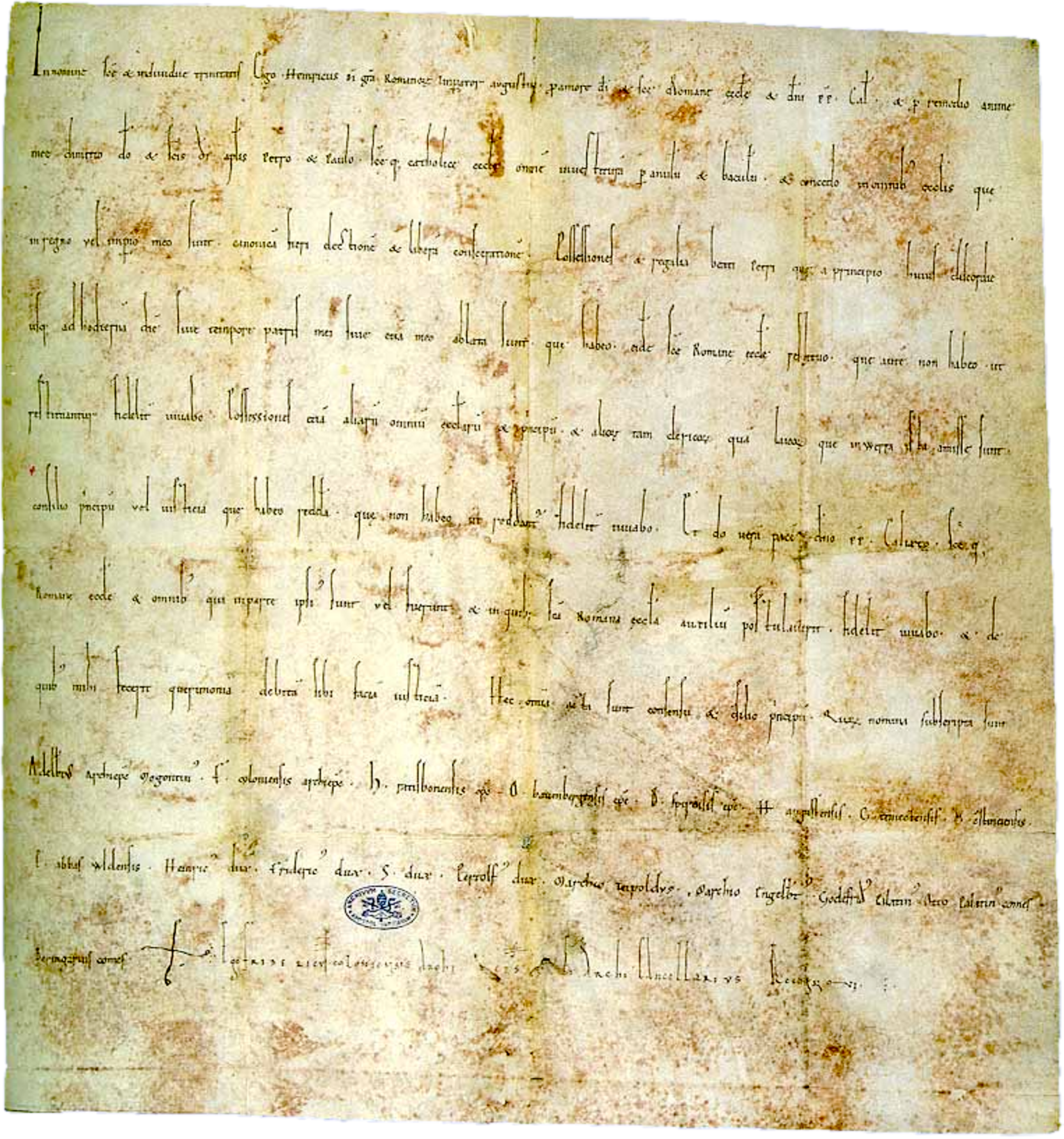
Concordat of Worms
The Concordat of Worms (Latin: Concordatum Wormatiense; German: Wormser Konkordat), also referred to as the Pactum Callixtinum or Pactum Calixtinum, was an agreement between the Catholic Church and the Holy Roman Empire which regulated the procedure for the appointment of bishops and abbots in the Empire. Signed on 23 September 1122 in the German city of Worms by Pope Callixtus II and Emperor Henry V, the agreement set an end to the Investiture Controversy, a conflict between state and church over the right to appoint religious office holders that had begun in the middle of the 11th century.
Not to be confused with either of the two Synods of Worms or the Edict of Worms.By signing the concordat, Henry renounced his right to invest bishops and abbots with ring and crosier, and opened ecclesiastical appointments in his realm to canonical elections. Callixtus, in turn, agreed to the presence of the emperor or his officials at the elections and granted the emperor the right to intervene in the case of disputed outcomes. The emperor was also allowed to perform a separate ceremony in which he would invest bishops and abbots with a sceptre, representing the imperial lands associated with their episcopal see.
Mouzon summit[edit]
In January 1118, Pope Paschal died. He was succeeded by Gelasius II, who died in January 1119. His successor, the Burgundian Callixtus II, resumed negotiations with the Emperor with the aim of settling the dispute between the church and the Empire. In the autumn of 1119, two papal emissaries, William of Champeaux and Pons of Cluny, met Henry at Strasbourg, where the emperor agreed in principle to abandon the secular investiture ceremony that involved giving new bishops and abbots a ring and a crosier.[8]
The two parties scheduled a final summit between Henry and Callixtus at Mouzon, but the meeting ended abruptly after the emperor refused to accept a short-notice change in Callixtus's demands.[8] The church leaders, who were deliberating their position at a council in Reims, reacted by excommunicating Henry. However, they did not endorse the pope's insistence upon the complete abandonment of secular investiture. The negotiations ended in failure.[9]
Historians disagree as to whether Calixtus actually wanted peace or fundamentally mistrusted Henry.[10] Due to his uncompromising position in 1111, Calixtus has been termed an "ultra", and his election to the papacy may indicate that the College of Cardinals saw no reason to show weakness to the emperor.[11][note 1] This optimism about victory was founded on the very visible, and very vocal opposition to Henry from within his own nobility, and the cardinals may have seen the emperor's internal weaknesses as an opportunity for outright victory.[12]
Worms[edit]
The Emperor received the papal legates in Worms with due ceremony,[26] where he awaited the outcome of the negotiations which appear to have actually taken place in nearby Mainz,[18] which was hostile territory to Henry. As such, he had to communicate via messenger to keep up with events.[26] Abbot Ekkehard of Aura chronicles that discussions took over a week to conclude. On 8 September, he met the papal legates and their final agreements were codified for publication.[15]
Although a possible compromise solution had already been received from England, this does not seem to have ever been considered in depth, probably on account of it containing an oath of Homage between Emperor and Pope, which been a historical sticking point in earlier negotiations.[26] The papal delegation was led by Cardinal bishop Lamberto Scannabecchi of Ostia, the future Pope Honorius II.[27]
Both sides studied previous negotiations between them, including those from 1111, which were considered to have created precedent.[28] On 23 September 1122, papal and imperial delegates signed a series of documents outside the walls of Worms.[29] There was insufficient room in the city for the number of attendees and watchers.[29] Adalbert, Archbishop of Mainz wrote to Calixtus of how complex the negotiations had been, given that, as he said, Henry regarded the powers he was being asked to renounce as being hereditary in the Imperial throne.[29] It is probable that what was eventually promulgated was the result of almost every word being carefully considered.[27] The main difference between what was to be agreed at Worms and previous negotiations were the concessions from the pope.[30]